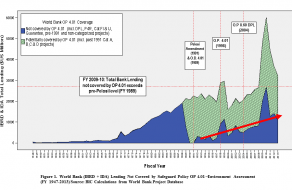This post is also available in: Spanish
The World Bank safeguard policies are the cornerstone of Bank support for sustainable poverty reduction and the key to effective development. In response to a changing global context, the Bank has considered how environmental and social safeguards should be adapted to promote its twin goals: ending extreme poverty and boosting shared prosperity. Civil society organizations (CSOs) from the South and North have engaged in a global campaign to hold the Bank accountable to stronger, more comprehensive and properly implemented safeguards.
After a four-year process of consultation, protest, and compromise, the World Bank’s Board of Directors approved a new Environmental and Social Framework (ESF) in August 2016. BIC and our civil society partners are continuing to advocate for transparency, participation, and accountability throughout the implementation process that has occurred since the ESF’s approval in order to ensure that the new ESF results in robust protections for people and the planet.
BIC focuses on the following areas of concern:
BIC also works closely with civil society partners who focus on the following concerns:
Other safeguards issues addressed in the ESF include Community Health and Safety, Indigenous Peoples, Cultural Heritage, and Financial Intermediaries. To learn more, see our “Resources” tab or contact BIC to get in touch with our partners focusing on these issues.
Updates
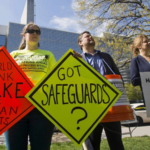 World Bank Guidance Notes for Borrowers Miss the Mark
World Bank Guidance Notes for Borrowers Miss the MarkThis post is also available in: SpanishIn a letter sent this week to the World Bank, over 30 civil society organizations from around the world called for substantial revisions to draft guidance notes...
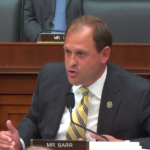 House Financial Services Committee Passes World Bank Accountability Act of 2017
House Financial Services Committee Passes World Bank Accountability Act of 2017This post is also available in: SpanishThe House Financial Services Committee passed the World Bank Accountability Act of 2017 today, authorizing U.S. participation in IDA, the World Bank’s fund for t...
 World Bank Works to Address GBV related Ramifications of Uganda Transport Sector Development Project
World Bank Works to Address GBV related Ramifications of Uganda Transport Sector Development ProjectThis post is also available in: Spanish In response to the harm caused by the World Bank funded Uganda Transport Sector Development Project (UTSDP), including the sexual exploitation of teenage girls,...
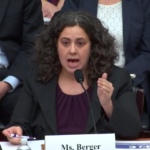 BIC’s Elana Berger Testifies Before House Financial Services Subcommittee
BIC’s Elana Berger Testifies Before House Financial Services SubcommitteeThis post is also available in: SpanishOn March 22, BIC’s Elana Berger testified before the House Financial Services Committee subcommittee on Monetary Policy and Trade. Berger’s testimony at the hear...
 BIC to Testify at Hearing with the House Financial Services Committee on “Examining Results and Accountability at the World Bank”
BIC to Testify at Hearing with the House Financial Services Committee on “Examining Results and Accountability at the World Bank”This post is also available in: SpanishMarch 2017 Elana Berger, BIC’s Social Inclusion and Accountability Manager, will testify before the Monetary Policy and Trade Subcommittee of the House Financial...
 Groups Call on Banks to Take Action to End Intimidation of Indigenous Peoples Affected by Geothermal Projects
Groups Call on Banks to Take Action to End Intimidation of Indigenous Peoples Affected by Geothermal ProjectsThis post is also available in: Spanish A global group of non-governmental organizations today called on the World Bank, European Investment Bank, Japan International Cooperation Agency, German...
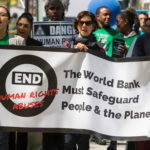 Human Rights Day 2016: World Bank should promote human rights through genuine citizen engagement
Human Rights Day 2016: World Bank should promote human rights through genuine citizen engagementThis post is also available in: SpanishAs we prepare to celebrate Human Rights Day on December 10th, we stand with dozens of other civil society groups around the world that are calling on development...
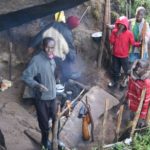 Alert: Eviction order issued to the Sengwer people to leave their ancestral land – with just 7 days notice
Alert: Eviction order issued to the Sengwer people to leave their ancestral land – with just 7 days noticeThis post is also available in: Spanish Despite promises from World Bank President Jim Kim over two years ago to personally assist in addressing tensions over indigenous land rights in Kenya, approxim...
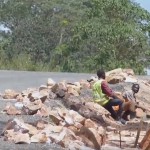 World Bank Board Approves Action Plan for Uganda Transport Sector Development Project
World Bank Board Approves Action Plan for Uganda Transport Sector Development ProjectThis post is also available in: SpanishOn November 22 the World Bank Board of Directors approved a Management Action Plan intended to address the Inspection Panel’s investigation of the Uganda T...
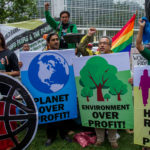 Pelosi Amendment’s Powerful Legacy for Development Finance Reform
Pelosi Amendment’s Powerful Legacy for Development Finance ReformThis post is also available in: SpanishWhile the recent election has cast a shadow of uncertainty over the future role of the United States in multilateral organizations such as the World Bank, it is...
Background
What are the safeguards?
The original safeguards were created largely as a collective call from communities and organized pressure from CSOs. In the 1980s and 90s, in response to strong public criticism of its involvement in controversial projects such as the Narmada Dam in India, which displaced over 300,000 people, the World Bank developed safeguards to help identify and minimize harms to people and the environment. Since that time, other international institutions have also created their own safeguards. These safeguards require borrowers to mitigate certain risks in order to receive bank financing. Examples include conducting an environmental and social impact assessment, consulting with affected communities, and restoring the livelihoods of displaced people.
When communities believe that World Bank-financed projects have not complied with the safeguards, they can bring their concerns directly to the institution. Since 1993, communities have been able to bring complaints to the World Bank’s Inspection Panel. This opens up additional avenues for dispute resolution, particularly when governments are not responsive to communities’ concerns.
Why was the revision of the safeguards important?
The World Bank’s safeguards review has affected the future design of development projects and has changed the ways we hold international institutions accountable for the problems that development projects can cause for people and the planet.
The World Bank was the first international organization to adopt safeguards, and its safeguards have since become the most influential model. The new safeguards shape how other international donors and investors approach environmental and human rights protection.
In recent years, global crises such as climate change, food and fuel shortages, and financial instability have emerged that affect all development projects. The Bank created the safeguards before these issues rose to prominence.
The balance of power has shifted, as well, with the rapidly expanding influence of emerging economies such as China, Brazil, and India, among other large middle income countries, at international institutions. At the same time, the World Bank is facing new competition from banks in emerging economies. In 2009 and 2010, China’s Export Import Bank and its Development Bank lent more to developing countries than the World Bank did. Financial institutions from emerging economies are providing governments with low cost alternatives to the Bank. This has led to a sense of competition and uncertainty over the World Bank’s role as a leader in development finance. The Bank has responded by making its safeguards more flexible in an effort to attract large borrowing countries. These changes have made it more difficult for CSOs to monitor and hold the Bank accountable for its use of public funds.
Nevertheless, the World Bank’s safeguards continue to serve as de facto international standards for other development banks and governments. As a result, the reforms to the World Bank’s safeguards have far reaching global impacts. See our specific concerns with how the new safeguards will address child rights, persons with disabilities, gender identity and sexual orientation, climate change, forests, information disclosure and stakeholder engagement.
When did the safeguards review happen?
The World Bank announced the start of the safeguards review in early 2011, and formally initiated its two-year safeguards review in July 2012, in the midst of a Bank-wide strategic reorganization. Upon release of an “approach paper” for the Safeguard review process in early October 2012, the Bank began a three-stage consultation process. Phase I ran from October 2012 to April 2013, and consisted of more than two-dozen multi-stakeholder consultations, as well as meetings with government officials, international experts, and civil society representatives.
The first draft Environmental and Social Framework (ESF), released in July of 2014, was met with wide criticism. The ESF contains the safeguard policies intended to protect communities and the environment in World Bank investment projects. For many CSOs and stakeholders, it ran contrary to World Bank President Jim Yong Kim’s promise that the new framework would not represent a weakening or dilution of current Bank social and environmental policies. Of significant concern is the proposed ESF’s use of ‘weasel words’, which protect the Bank from having to assume responsibility for compliance with the safeguards. Phrases such as ‘as appropriate,’ ‘where possible’ and ‘within a timeframe acceptable to the Bank’ allow for deferred risk appraisal, unclear supervision requirements and ‘opt-outs’, all of which undermine the past thirty years’ progress in protecting the poor and the environment from harm in Bank-funded projects. For a collection of media coverage and CSO reactions to the first draft, see our Safeguards Reactions Roundup.
The second draft ESF was released for public consultation in August 2015, beginning Phase III of the review process. The draft was met with wide criticism from governments, civil society organizations (CSOs), UN experts and local communities alike. Click here (العربية|Arabic) (Spanish|Español) for BIC’s Guide to a First Look at the World Bank’s Revised Environmental and Social Framework on the second draft. Click here (العربية|Arabic) for BIC’s Safeguards Training Packet for consultation participants.
What was the outcome of the safeguards review?
However, the lynchpin of a successful, adaptive model is genuine understanding of local context, which requires the voices of civil society and communities to be at the heart of the development agenda. Context—in all its complexity—is not something that the Bank can understand based solely on engagement with its client governments, and the Bank has not excelled in listening to alternative voices. When the World Bank plans and implements projects based upon faulty assumptions of local context, those projects frequently cause significant harm to local communities, including in particular the poor and marginalized among them.
The final ESF does not appear to have taken on board the vast majority of the input provided by civil society, with Bank management instead clearly prioritizing the desires of client governments. For the new, more flexible approach to be successful, the views of communities and civil society must be prioritized. The Bank can start demonstrating this commitment now by better integrating the participation of civil society and communities, along with those of think tanks, International NGOs, and UN bodies, in the process of implementing the new ESF to ensure it is responsive to the needs of those it seeks to protect.
Concerns
The effectiveness of the World Bank’s revised ESF is compromised by several overarching issues, particularly its shift away from a rules-based approach to a more flexible “adaptive” approach. While these policies move the Bank away from a top down, donor driven model towards a more locally driven model, the success of these new, more flexible safeguards will require the voices of civil society and communities to be at the heard. In the past the Bank has not excelled in listening to these alternative voices, which has resulted in projects based upon faulty assumptions of local context that cause harm to local communities, especially the poor and marginalized among them.
To ensure that the new ESF will provide meaningful environmental and social protection when it is implemented in 2018, BIC will closely monitor the implementation of the new safeguards with a focus on our longstanding areas of concern, including:
New types of lending
Traditionally, the World Bank finances specific development projects, such as dams, roads, and oil and gas infrastructure. These are called “investment loans.” Safeguards were designed to manage the environmental and social risks associated with these specific projects. However, financing is now being channeled in ways where the borrower’s actual use of World Bank funds is often unknown and less accountable. These instruments are called “development policy loans” and “ programs for results.” The environmental and social impacts of these new investments can be significant and negative, but are extremely difficult for CSOs to monitor and are not safeguarded with the same rigor and transparency as investment lending. The World Bank has developed assessment tools that are appropriate for these new types of lending, although their use is not guided by the same requirements as for investment lending.
Non-investment lending activities are growing as a percentage of Bank lending.
Other IFIs, such as the Asian Development Bank and governments provide safeguards coverage of non-IL activities. The Bank has fallen behind international best practice.
The World Bank safeguards should not be limited to investment lending, but rather should include full and systematic consideration of possible safeguards application to all Bank activities and operations with potential for significant environmental, social, or human rights impacts. CSOs will continue to push hard for safeguards application to all types of Bank activities with potential for significant social, environmental, and human rights impacts.
Reliance on local laws and borrower systems
Globally, donors are expressing a desire to shift away from exclusive reliance on an IFI’s environmental and social safeguards towards greater support for a borrower’s systems for managing environmental and social risk or reliance on developing countries’ local laws. CSOs insist that support for greater country ownership of safeguards and support for borrower systems is not at odds with maintaining high, common, minimum standards for risk management.
The Bank, for example, has developed a “country systems” approach, which allows borrowing governments to rely on their own local laws instead of following the safeguards. This helps to build countries’ own capacity, but can also mean that development projects go forward in the short term in the absence of strong environmental and human rights protections. Many poor communities do not have a voice in how their government chooses a development path or decides on specific high risk investments. While it is important to ensure country ownership over development projects, this ownership should be democratic, environmentally sustainable, and socially just.
The new safeguards transfer of responsibility for safeguards implementation to borrowing countries. Some borrower governments see this transfer as burdensome. Civil society shares this concern, especially considering that the Bank lacks the jurisdiction to ensure that Borrowers assume accountability for harm when safeguards fail. Both government and civil society concerns are exacerbated by the lack of 1) An updated safeguards budget and implementation plan 2) A methodology for determining whether borrower frameworks offer protections equivalent to Bank safeguards.
Timing of safeguards application: moving them “upstream” in the decision making process
The Bank’s safeguards can work better before projects are identified. For many types of risk (climate, human rights) the Bank’s country assistance strategy (which determines, in part, the kinds of projects that are funded in a particular country for 4-6 years) represents the earliest opportunity to assess cross-cutting risks and to set priorities. The Bank seems to agree. The new corporate strategy calls for a more strategic, evidence-based approach to designing Country Partnership Frameworks.
It is crucial that certain safeguards are triggered before World Bank Executive Directors approve them. Timing requirements for the crucial evaluations ensure that plans are in place to protect the communities and ecosystems that a project will affect, before the project begins.
Human rights
Most governments and international institutions use human rights standards as a way to manage risks and recognize the rights of disempowered people, particularly the poor. In many cases, CSOs have helped to incorporate human rights—ranging from the rights to life, food, and health to freedom from discrimination—into national constitutions and laws. When these same governments sit on the World Bank’s Board of Directors, however, they refuse to explicitly incorporate human rights into Bank policies. The World Bank continues to base this refusal on its Articles of Agreement, established at the time of the Bank’s founding in 1944, which prohibit it from involving itself in the politics of member countries.
According to many from civil society, and even former World Bank General Counsel Roberto Dañino, this excuse no longer holds water, as country governments and other international institutions have made concrete commitments to respect universal human rights. UN Special Rapporteur on extreme poverty and human rights Professor Philip Alston has also been very vocal about the World Bank’s aversion to human rights, which he denounces in a recent UN report on the subject. At a Tom Lantos Human Rights hearing in September 2015, he noted that the Bank currently “treats human rights more like an infectious disease than universal values and obligations.”
While the Vision Statement of the approved safeguards includes language on human rights, and specifically references the Universal Declaration of Human Rights, the language is ‘aspirational’ and in no way binding. The Bank is sending a clear message to the world, and to its own staff, that respect for human rights is discretionary. Civil society continues to push for the Bank to respect human rights in all of its lending activities, and enforce borrower international treaty obligations.
Resources
Tracked Change Version of Second Draft Framework for Consultation
ESF Consultation Paper (العربية|Arabic) (Español|Spanish)
Inspection Panel Comments on the Second Draft of the Proposed ESF
Indicative List of Issues for Phase 3 Consultations
Summary of Phase 2 Consultations and Bank Management Responses
Report by Philip Alston, Special Rapporteur on extreme poverty and human rights on Human Rights and the World Bank
Analysis of Second Draft prepared by the Dutch Sustainability Unit of the Netherlands Commission for Environmental Assessment
Civil Society and Media Reactions
PRESS RELEASE: Dangerous Rollback in Environmental and Social Protections: World Bank’s New Framework Undermines President Kim’s Commitment to “No Dilution”World Bank Safeguard Proposal ‘Dangerous,’ Rights Groups Say (ICIJ)
Why the World Bank Should Embrace Human Rights (Human Rights Watch)
How is the World Bank’s newest safeguards document different from the initial draft? (DevEx)
World Bank Safeguard Review (Center for International Environmental Law)
Letters to World Bank President Jim Yong Kim
U.S. Senate letter on improving World Bank road safetyLetter from Council for Global Equality on LGBT inclusion in Safeguards
World Bank Executive Director Statements on Second Draft
Statement from Mr. Matthew T. McGuire, Executive Director for the United StatesBrief of statement made by Mr. Subhash Chandra Garg, Executive Director for Bangladesh, Bhutan, India and Sri Lanka
Statement from Mr. Jose Alejandro Rojas Ramirez, Executive Director for Costa Rica, El Salvador, Guatemala, Honduras, Mexico, Nicaragua, Venezuela, and Spain
COMMENTS OF THE GOVERNMENT OF GUYANA ON THE SECOND DRAFT OF THE WORLD BANK’S ENVIRONMENTAL AND SOCIAL FRAMEWORK
United Kingdom statement on the World Bank Safeguards Review
Nordic-Baltic Position, 3rd Phase consultations, Safeguards Review
Brazilian Government Comments on World Bank Environmental and Social Safeguards Policy Review
Submissions
Community Voices from Lagos for Submission to the Safeguards Policy Review March 2016Comments on World Bank Second Draft ESF from Center for International Environmental Law March 2016
Comments from NARASHA COMMUNITY DEVELOPMENT GROUP, Kenya March 2016
Coalition des organisations de la Société Civile sur le Financement du Développement, Contribution à la révision des sauvegardes environnementales et sociales de la Banque Mondiale March 2016
Comments from World Resources Institute March 2016
Joint Submission from the Ulu Foundation, Both ENDS, Ecological Justice Indonesia, and Urgewald March 2016
Forest Peoples Programme Briefing Note on Effective Participation and Free, Prior and Informed Consent March 2016
Forest Peoples Programme Compiled Comments March 2016
Comments on Overarching Human Rights Provisions in the World Bank’s Environmental and Social Framework, Coalition for Human Rights in Development March 2016
Letter to the World Bank from Labor Unions and Civil Society Organizations in Myanmar (Burma) regarding ESS2: Labor and Working Conditions March 2016
Comments from the Human Rights Campaign March 2016
Comments of EarthRights International on the World Bank’s Second Draft Environmental and Social Framework (July 2015) March 2016
Oxfam Comments on Second Draft of World Bank Environmental and Social Framework March 2016
Amnesty International – Submission to the World Bank on the second draft of the Environmental and Social Framework March 2016
Both ENDS assessment of the Policy framework and ESS 1 in light of World Bank President Kim’s commitment to “no dilutions” of existing Bank safeguards March 2016
Submission on the Second Draft Environmental and Social Framework, AU Program on International and Comparative Environmental Law March 2016
Recommendations from the Disability and World Bank Safeguards Campaign ESS1, ESS10, Glossary March 2016
Submission on Child Rights from the Bank Information Center March 2016
Joint Submission on ESS6 from a Coalition of Civil Society Organizations March 2016
Submission on Land Rights and Involuntary Resettlement in the World Bank Proposed Environmental and Social Framework Feb 2016
Indian Law Resource Center Comments on the World Bank’s ESF Second Draft Feb 2016
Sierra Club and BIC Submission on the Climate and Resource-Efficiency related Provisions of the Second Draft ESF Feb 2016
Conservation International’s Comments on new draft World Bank ESF Feb 2016
Gender Analysis, Conclusions & Recommendations on the World Bank Environmental and Social Framework Second Draft Dec 2015
Submission from Human Rights Watch on the World Bank’s second draft ESF Oct 2015
World Bank Guidance Note, Stakeholder Consultations in Investment Operations, November 2011
Civil Society Materials for Phase 2 Consultations
Safeguards Case Studies of World Bank Group Projects , April 2014Safeguards Consultation Background Packet
ESS1 – Environmental and Social Assessment
ESS2 – Labor
ESS3 – Climate Change
ESS5 – Land and Resettlement
ESS6 – Biodiversity
ESS7 – Indigenous Peoples
ESS10 – Information Disclosure and Stakeholder Engagement
Talking points on Child Rights
Talking points on Disability Rights
Talking points on Gender & SOGIE
Talking points on Gender
Talking points on Human Rights
Talking points on the Environmental and Social Policy (ESP)
What IEG Recommends about the Safeguard Reform – Facts and Myths
Letters to World Bank President Jim Yong Kim
Nobel Women’s Initiative Letter on draft ESFLetter to Jim Kim on behalf of twenty-eight Special Procedures mandate holders of the U.N. Human Rights Council
Letter from Bank on Human Rights and signatories regarding the safeguards consultation process
Letter on Child Rights and Safeguards from 55 endorsing organizations
Submissions from CSOs
Civil society statement on World Bank Safeguards from 360 endorsing organizationsCritiques and Recommendations on WB Safeguards from Egyptian CSOs
بيان تفصيلى لمؤسسات المجتمع المدنى المصرى حول السياسات الحمائية الجديدة للبنك الدولى(Critiques and Recommendations on WB Safeguards from Egyptian CSOs- Arabic)
بيان من مؤسسات المجتمع المدني المغربي (Statement from Moroccan CSOs on the Bank’s Safeguard Policies, Arabic)
Comments on WB Safeguards from Ulu Foundation- Learning from the ADB
Oxfam Submission on Phase 2 of WB Safeguards Review
Joint Nordic CSO input on World Bank Safeguards
World Resource Institute comments on draft ESF
Transparency International’s Submission on World Bank Safeguards
Comments from Latin American and Caribbean CSOs on Draft ESF and WB Consultation Process, (Spanish)
- Environmental and Social Assessment (ESS1)
Disability and World Bank Safeguards Campaign ESS1 Red-line Edits
Conservation International ESS1 Redline Edits - Labor (ESS2)
Statement by Global Unions to the 2014 Annual Meetings of the IMF and World Bank - Climate Change (ESS3)
Climate Change Model Policy for Safeguards
Comments on the Climate and Resource Efficiency-Related Provisions of the Draft ESF
Sierra Club Proposed Redline Edits ESS3 - Community Health and Safety (ESS4)
Population Action International Comments on ESS4 - Involuntary Resettlement (ESS5)
Joint Safeguards Submission on Resettlement and Land
Land Rights and the New WB Safeguards_Case Studies by Inclusive Development International - Biodiversity (ESS6)
Safeguard Submission on Biodiversity, Forests and Forest-dependent Peoples
Conservation International Redline Edits ESS6
Comments on ESF from US Federal Ministry of Environment - Indigenous Peoples (ESS7)
Recommendations from Asia Indigenous Peoples Pact Foundation
Statement from Tanzanian Indigenous Peoples organizations on the proposed ESF (27 endorsing organizations) - Information Disclosure and Stakeholder Engagement (ESS10)
BIC Submission on ESS10 on Information Disclosure and Stakeholder Engagement
Submission on ESS10 and Accountability - Child Rights
Bank Information Center Child Rights Submission
BIC Child Rights Submission- Tata Mundra Case Study
BIC Child Rights Submission- MUTP Case Study
BIC Child Rights Submission- Malawi Water Project Case Study - Disability Rights
Redline edits of ESS1 Annex 1_Disability and World Bank Safeguards Campaign
ESS1 Proposal for an Annex 2 on Universal Accessibility and Inclusion Plan_Disability and World Bank Safeguards Campaign
Submission from International Disability Alliance and International Disability and Development Consortium
Input from Light of the World on WB Safeguards Review
Inputs on ESS Framework from Persons with Disabilities in Tanzania/Disabled People International - Gender and SOGIE
Gender and SOGIE Joint Submission
Gender and SOGIE Model Policy
Gender Review and Recommendations on Proposed ESF from Gender Action
Submissions from National Governments
Comments from the Government of FranceComments from the Government of Germany
US Government Comments on Draft ESF
Comments and Recommendations from China on the Proposed New Safeguard Policies
Brazilian Government Comments on the Environmental and Social Framework Policy
Comments of the Government of India on the World Bank Consultation of the Safeguard Review
Republic of Indonesia Response to WB Safeguard Policies
Comments from the Russian Executive Director’s Office EDS23
Nordic/Baltic Comments on Draft ESF
Ministry of Labor Tajikistan
Comments from the Executive Director for Costa Rica, El Salvador, Guatemala, Honduras, Mexico, Nicaragua, Spain, and República Bolivariana de Venezuela
World Bank Response to CSO Top Priorities Letter, April 7, 2014
CSO Safeguard Top Priorities Letter, March 25, 2014
World Bank Safeguards Review Team Presentation at the 2014 Spring Meetings, April 12, 2014
United States Comments on the World Bank Safeguards Review (Phase 1), April 29, 2014
Initial Comments by Civil Society Organizations on the World Bank Safeguards Review, December 2012
Arabic| Spanish
Letter to President Kim accompanying CSO Comment on Safeguard Approach paper, December 20, 2012
World Bank reply to letter on Safeguard Policy review, January 13, 2013
CSO Letter to President Kim on Safeguards and Investment Lending Reform, September 7, 2012
CSO letter on World Bank safeguards review, September 14, 2011
World Bank response to CSO letter on safeguards review, September 20, 2011
World Bank Safeguards Review Background, July 28, 2011 (Español), (Français)
CSO Civil Society Comments and Concerns about the World Bank’s Proposed “Program for Results” (P4R)
IEG Evaluation Brief: Evaluative Directions for the World Bank Group’s Safeguards and Sustainability Policies, No. 15 (July 2011)
IEG Evaluation: Safeguards and Sustainability in a Changing World (2010)
Asian Infrastructure Investment Bank (AIIB):
In 2014, the NGO Forum on the ADB started advocacy and monitoring work on the new multilateral development bank, the Asian Infrastructure Investment Bank (AIIB). Follow BIC’s work on AIIB’s draft Environmental and Social Framework.
Asian Development Bank (ADB):
The NGO Forum on the ADB covers safeguards at the Asian Development Bank.
Inter-American Development Bank (IDB):
Implementing Guidelines – Environment and Safeguards Compliance Policy, 2006Independent Advisory Group on Sustainability Final Report, 2011
Contacts
Child Rights Program Manager
eberger@bankinformationcenter.org Margaret Federici
Coordinator, Safeguards and Climate Program
mfederici@bankinformationcenter.org










